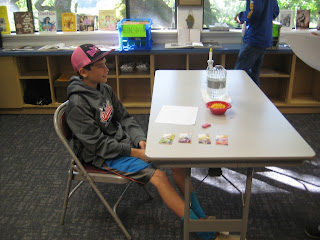This turned out to be the longest Shekel Game ever played, lasting 45 minutes (thank goodness I always come prepared with many more questions than we usually have time for!). Usually, this is a group game, allowing the students in each group the chance to put their heads together to arrive at the correct answer to the review questions. Yesterday, each student opted to become a team unto himself, and so each only had his own memory to rely on for the answers. There were several questions asked where the student was sure he didn't know the answer (and so bet nothing that he could answer the question correctly), but then came up with the correct answer after all (and sadly earned nothing). I learned that the three boys recalled quite a bit of information that I had shared with them during the previous weeks; the boys (hopefully) learned that if you take the time to think things through, you can often recall quite a bit of information.
 |
| Joey is all settled in his "territory" as well, ... |
 |
| ...as is Gabe. Let the game begin! |
After we finished playing the game, we still had time for a Hebrew Through Movement session, during which we practiced all the Pesach (Passover) Hebrew vocabulary we had learned over the past two and a half weeks, and also practiced acting out the "Mah Neeshtana" (the Four Questions). Our session was cut short, however, by a fire drill (which had been planned by Rabbi Greninger and announced to the teachers beforehand). It took us less than a minute to grab the earthquake preparedness bag, the teacher emergency binder and attendance slip and leave the room in an orderly fashion. All the classes met up on the lawn outside the Sanctuary, where teachers took attendance and let Rabbi Greninger know, class by class, that all children and teachers and TA's were present.
From the lawn, we all filed into the Sanctuary where Rabbi Greninger and Cantor Korn led us in prayer and singing Pesach songs, to get us all in the mood for the upcoming holiday.
I look forward to seeing everyone back in the classroom again after the Pesach holiday, on Tuesday or Wednesday, April 18 or 19. In the meantime, I wish you all a very enjoyable and meaningful Pesach holiday with your families and friends.
CHAG HA'MATZOT SAMEACH! HAPPY HOLIDAY OF MATZAS - HAPPY PESACH!




No comments:
Post a Comment